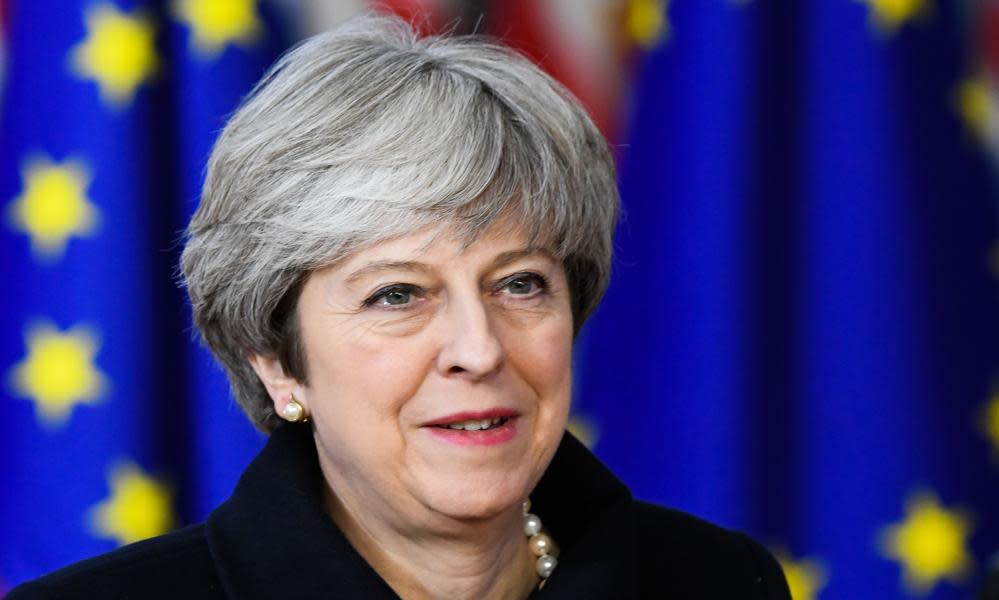EU leaders agree Brexit talks can move on to phase two

EU leaders have ruled that sufficient progress has been made in the first phase of Brexit talks, allowing negotiations to move on to discussions about Britain’s future outside the bloc.
While some questions over the three opening issues that have so far dominated the negotiations still remain, a joint proposal from the UK and the European commission to move the talks on has been accepted.
The president of the European council, Donald Tusk, tweeted: “EU leaders agree to move on to the second phase of #Brexit talks. Congratulations PM @theresa_may.”
The leaders have also adopted a set of guidelines spelling out their terms for a transition period, and a rough timetable for the next few months.
Initially, the second phase of Brexit talks will be dominated by discussions over the transition period, under which the UK will continue to abide by EU law for roughly two years, but not have a role in any decision-making institutions.
Theresa May has been given three months to get agreement within the cabinet on the UK government’s vision of a future trade deal, after which substantive talks on the future relationship will begin.
In response to the development, the prime minister tweeted: “Thank you to Presidents @JunckerEU and @donaldtusk. Today is an important step on the road to delivering a smooth and orderly Brexit and forging our deep and special future partnership.”
The Brexit secretary, David Davis, tweeted: “Today is a good day for Brexit and an important step for Britain. Thanks to hard work and determination, we have reached an important milestone and have achieved #sufficientprogress. There is still lots of work to come but we are ready for the next stage.”
In a joint statement, the leaders of the British Chambers of Commerce, Confederation of British Industry, Federation of Small Businesses, Institute of Directors and the manufacturers’ organisation EEF warned that jobs were at risk unless swift progress was made in the second phase.
“It is our collective view that the transition period must now be agreed as soon as possible, to give businesses in every region and nation of the UK time to prepare for the future relationship,” they said. “Further delays to discussions on an EU-UK trade deal could have damaging consequences for business investment and trade, as firms in 2018 review their investment plans and strategies.”
Negotiators from the UK government and the commission have spent nine months wrangling over the opening issues in the negotiations: the rights of of the 4.2 million UK and European citizens who have made lives in each other’s territories; the divorce bill; and the thorny issue of how to avoid a hard border with Ireland once the UK leaves the bloc.
On Thursday night the German chancellor, Angela Merkel, encouraged leaders to give May a round of applause as the British prime minister ended a short address to a leaders’ dinner.
May had sketched out Britain’s hopes for the second phase including swift agreement on the terms of a transition period to give British and European businesses some certainty about the terms of trade after 29 March 2019, when the UK leaves the bloc.
Arriving at the second day of the summit in Brussels on Friday, Jean-Claude Juncker, president of the European commission, said the applause had been deserved. “Some of us thought, including me, that she did make a big effort and this has to be recognised,” he said. “The second phase will be significantly harder than the first and the first was very difficult.”
Asked whether, in the wake of May’s defeat in the Commons this week over Brexit legislation, the UK might still stay in the EU, he added that it “depends on the British parliament and British people”.

Leo Varadkar, the Irish prime minister, said European leaders had not debated with May after her address because of the rules over article 50 negotiations, under which discussions with the UK are supposed to go through the commission’s negotiator, Michel Barnier.
He said, however, that after the update on the state of the negotiations “some people offered some good luck, merry Christmas remarks and there was a light round of applause after that”.
The Austrian chancellor, Christian Kern, said the applause had not been very enthusiastic although he also added that it was “well deserved”.
“We’re sitting in the same boat. We all have the same interests,” Kern said. “Of course we are backing her. I’m following closely the discussions in the United Kingdom but I think the achievements of Mrs May we have to respect. We have made some significant progress which is good and everybody has trust in her leadership.”
Last week, after intense last-minute negotiations with the Democratic Unionist party over the UK’s plans for the Irish border, an agreement was struck between Juncker and May to allow the talks to widen to discuss the terms of a transition period once the UK leaves the EU, and the outline of a possible trade deal.
The prime minister of Malta, Joseph Muscat, said Thursday night’s discussion with May had been “pretty constructive”, though he acknowledged there was some concern about “developments in London”.
Of the next phase, he said: “The first real big step is for the UK to say very clearly what it wants in clear terms.”
Dalia Grybauskaitė, the president of Lithuania, said she expected phase two to “probably start in March after the next summit, and once the terms of a transition period are tied down by the two negotiating teams”.
The Italian prime minister, Paolo Gentiloni, said he “welcomed with great courtesy [May’s] kindness in making herself available” for the summit dinner.
“We know that phase two will not be more simple than phase one,” he added.

 Yahoo News
Yahoo News 
